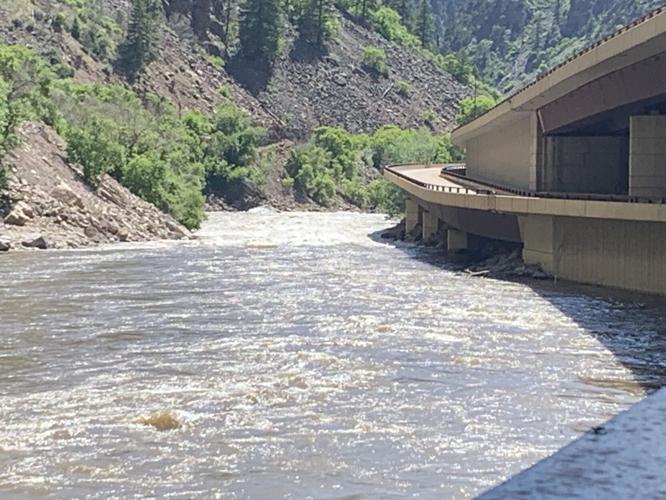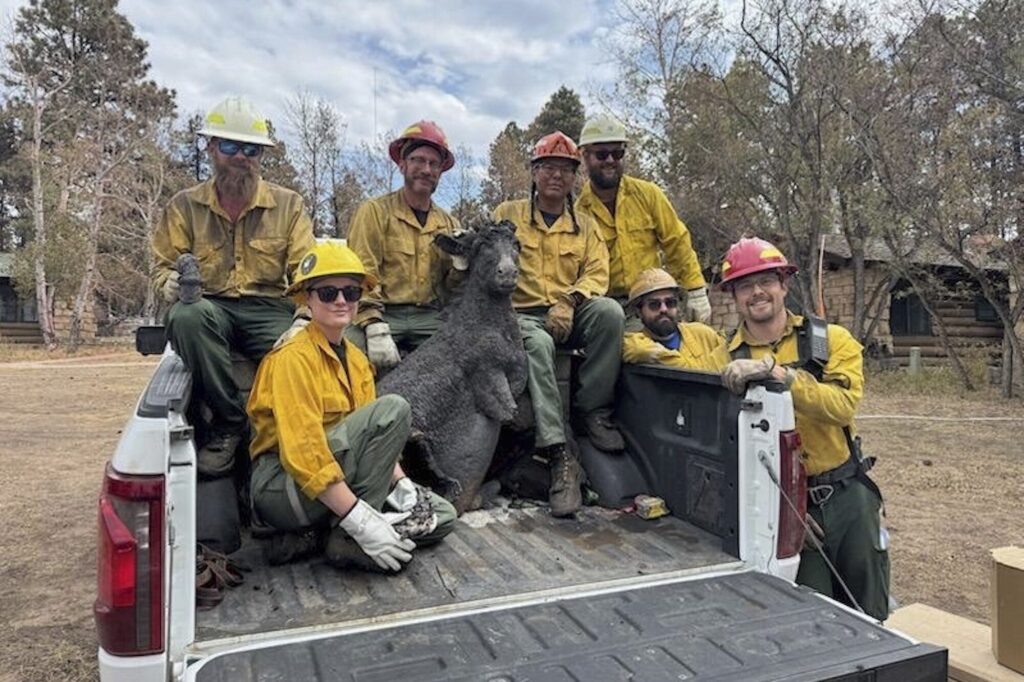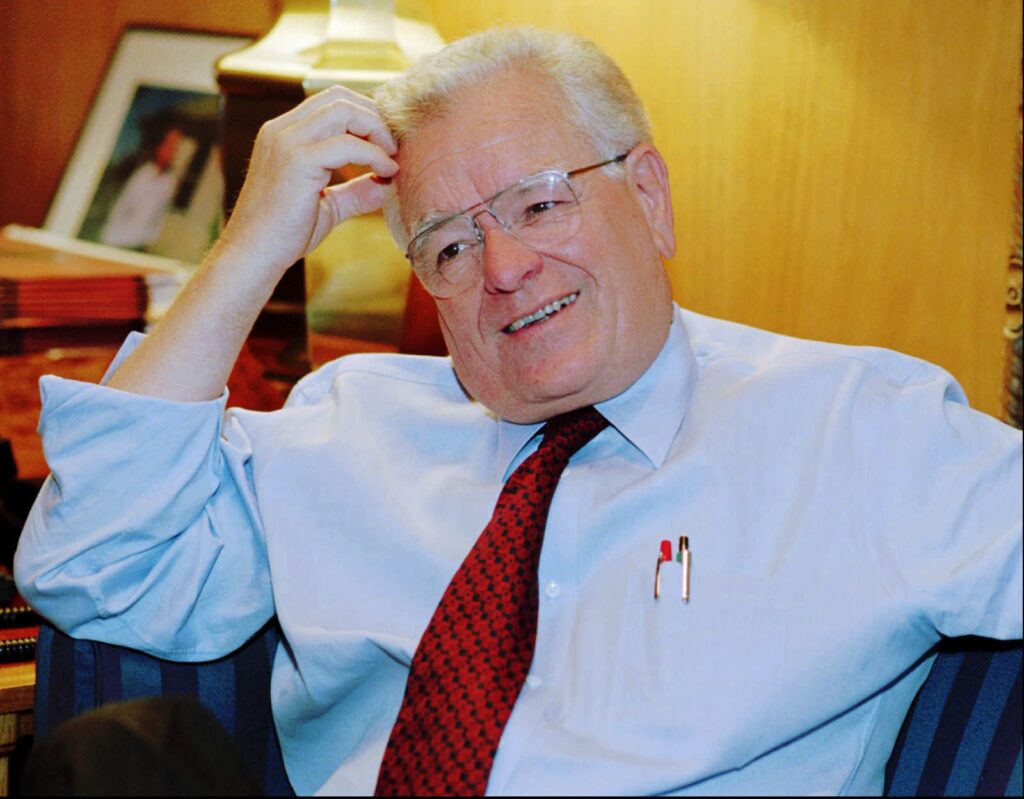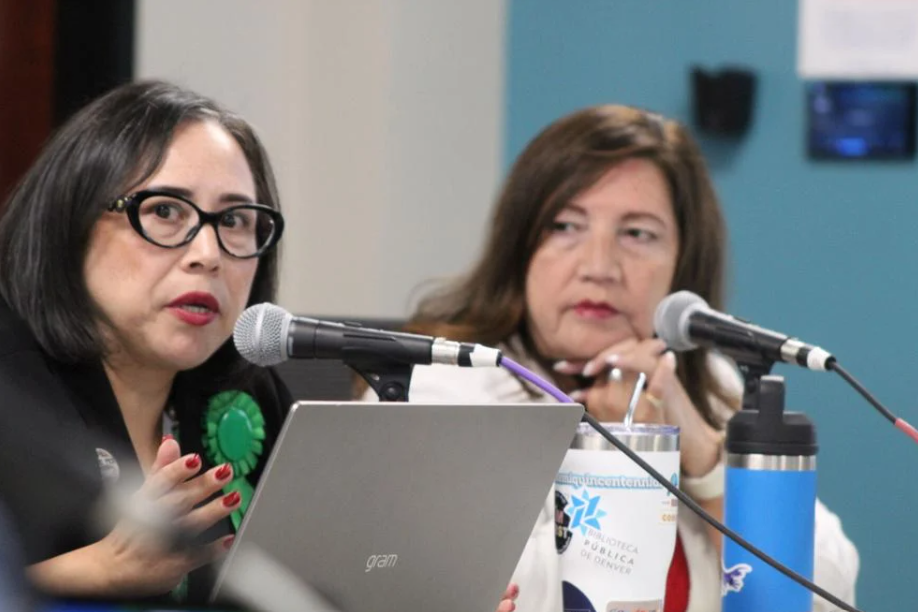Colorado River coalition gains funding to purchase of 1 million acre-feet of Shoshone water rights
The flow of the Colorado River past Xcel’s Shoshone power plant just east of Glenwood Springs is running at around 12,000 cubic feet per second this week. If that sounds like a lot, it is.
It’s more than double the flow from just two weeks ago, and fast enough to shut down commercial rafting for the time being, along with cutting off the Glenwood Canyon bike path since parts are now flooded.
And there’s gold in all that water. But it’s not the mineral. The gold is the water itself.
A deal reached between Xcel Energy and the Colorado River Water Conservation District late last year means the river district will take ownership of a million acre feet of water every year — in perpetuity. It won’t add water to the Colorado River, but it will ensure that river flows remain healthy for decades to come. That’s more water than is stored in Blue Mesa Reservoir, the state’s largest.
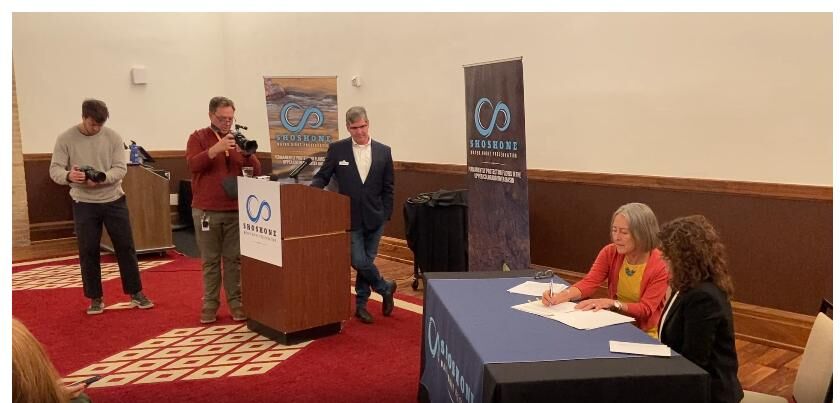
Signing the purchase-sale agreement for Shoshone water rights on the Colorado River last December: At right, Hollie Velasquez Horvath, regional vice president for state affairs and community relations for Xcel; to her left, Kathy Chandler-Henry, president of the Colorado River Water Conservation District and Eagle County commissioner. Standing at the podium is Andy Mueller, the river district's general manager. (COURTESY: Colorado River Conservation District.)

Signing the purchase-sale agreement for Shoshone water rights on the Colorado River last December: At right, Hollie Velasquez Horvath, regional vice president for state affairs and community relations for Xcel; to her left, Kathy Chandler-Henry, president of the Colorado River Water Conservation District and Eagle County commissioner. Standing at the podium is Andy Mueller, the river district’s general manager. (COURTESY: Colorado River Conservation District.)
In the wake of what experts anticipate is a hotter, drier climate future, increasing price of water and interest in water speculation, the district didn’t want to miss the opportunity of available funding and a willing seller.
The deal, which is 20 years in the making, taps the state’s largest and most senior non-consumptive water right on the Colorado River, which dates back to 1902 and is known as the Shoshone rights, named for the power plant that sits just east of Glenwood Springs. The water rights flow through the turbines at the Shoshone power plant.
The plant has served a role as grid support to Xcel’s electric system on the Western Slope and is a valuable asset as the utility seeks to satisfy the transition away from fossil energy that Colorado’s policymakers have pushed for.
It doesn’t mean the plant will stop generating hydropower, although it has been shut down for about 14 months, due to damage to a turbine and worries over rock falls. The power plant will stay in service, operated by Xcel, and will continue to produce 15 megawatts of renewable electricity for about 15,000 customers.
The coalition will lease back the water to Xcel to keep the plant operating.
Why does it matter?
The Shoshone water right plays a critical role in compliance with the federal Endangered Species Act. The Keep Shoshone Flowing coalition says more than 1,250 Colorado water projects on both sides of the Continental Divide rely on the Upper Colorado River Endangered Fish Recovery Program to maintain compliance with the law.
That’s tied to instream flow rights, which is water that protects the environment, including fish and riparian habitats, according to Western Resource Advocates’ Bart Miller.
In dry years, Shoshone calls between 41,000 and 86,000 acre-feet of water downstream from the power plant, “bolstering needed cold-water flows in the Grand Valley’s 15-Mile Reach, critical habitat for Colorado’s four native fish listed under the Endangered Species Act,” the Keep Shoshone Flowing coalition said. Those species are the Colorado Pikeminnow, Humpback Chub, Bonytail, and Razorback Sucker.
The 15-mile reach is 15 miles of the Colorado River that flows from Glenwood to Grand Junction. The Colorado Water Trust calls the 15-mile reach “the heart of the Upper Colorado River Basin.”
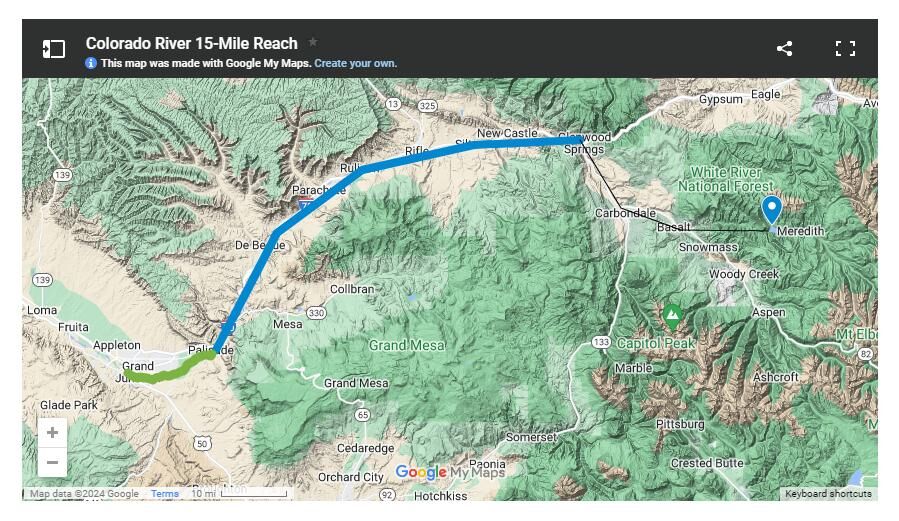
The "15-mile reach," the heart of the Upper Colorado River Basin. (COURTESY: Colorado Water Trust)
Marianne Goodland marianne.goodland@coloradopolitics.com

The “15-mile reach,” the heart of the Upper Colorado River Basin. (COURTESY: Colorado Water Trust)
Keeping the water in the Colorado River also improves water quality benefits for West Slope communities and helps sustain the $14.6 billion water-based recreation economy that depends on the river, as well as nearly $12 billion in agricultural activity.
The heart of the deal
The river district’s desire to maintain those flows actually goes back 80 years, almost to the founding of the district itself, which dates back to 1937.
What made the deal possible is an agreement between the river district and Denver Water, which held first right of refusal, should Xcel ever decide to sell those water rights. The Colorado River Cooperative Agreement, signed in 2013, ensured a West Slope entity would take over those first rights when the time came.
That happened last year, and the river district jumped on it, along with its partners in the Keep Shoshone Flowing coalition, which includes 19 West Slope local governments.
Michelle Aguayao, a spokesperson for Xcel, said the agreement has been in the works for years.
“We believe this is an important agreement for our 1.6 million electric customers we serve statewide by allowing us to continue generating clean electricity as part of our commitment to be good steward of the Colorado River and all who rely on it,” she said.
She added that, “while it may seem that this happened suddenly, this agreement has been in the works for years. That this agreement preserves water usage for all, including our use as a non-consumptive user, is key.”
The cost to buy those water rights is $98.5 million, and backers are better than halfway there in obtaining those dollars, with the recent signing of the state’s annual water projects bill, which will provide $20 million toward that goal.
On Tuesday, Garfield County added another $3 million, bringing the total to around $55 million.
Also contributing to the pot: $1 million from Eagle River Water & Sanitation District and the Upper Eagle Regional Water Authority; $2 million from the city of Glenwood Springs, which sees the outdoor recreation dollars the Colorado River provides; $4 million from Eagle, Mesa and Grand counties; and, $20 million from the district’s Community Funding Partnership, a tax approved by local voters in 2020.
The district is hoping some of the rest will come from the federal government through the Inflation Reduction Act’s latest round of Western drought funding, known as Bucket 2.
The Biden administration announced last week it would put $700 million into long-term water conservation projects for the Lower Colorado River Basin. That prompted questions at last week’s Getches-Wilkinson conference on the Colorado River at the University of Colorado law school as to when the Upper Basin would get its share of that funding.
“I look forward to … working with the Upper Basin on Bucket 2 (funding),” said Bureau of Reclamation Commissioner Camille Calimlim Touton. She added that, for now, “let’s be excited about Bucket 2 in the Lower Basin.”
Andy Mueller, the general manager for the river district, said the key is when one looks at the water rights administration on the main stem of the Colorado River, Shoshone results in a significant amount of water being available in the river for recreation use above and below the plant.
It drives economic factors, he told Colorado Politics recently. It also drives the ecological health of the river, which is why agencies, such as the U.S. Forest Service and the Bureau of Land Management, which manage the ecological health of stretches of the river, are very much in favor of the deal. The critical habitat for the endangered fish species starts in Rifle and goes all the way to Lake Powell, Mueller said.
If that water isn’t there for the endangered fish, “we already struggled at meeting the minimum flow levels set by the recovery program. We’re trying to figure out ways to get enough water to meet that. If you take away Shoshone, the hole just gets bigger,” he said.
Mueller emphasized the river district doesn’t want Denver, Colorado Springs, Aurora or Northern Water to be without water. But he added that all of those systems were designed to accommodate not having access to the Shoshone water rights.
“It’s not depriving people of water that they have today that they won’t have” in the future, he said, adding that the agreement keeps the river in balance.
Once that water hits the 15-mile reach, it also goes across the state line. Given that it keeps the river in balance — not to mention compliance with the Endangered Species Act and shoring up Lake Powell — the river district believes the federal government will be interested in investing in it.
The water also helps with another problem — water conservation.
Under a system conservation pilot program managed by the Upper Colorado River Commission, Colorado produced about 38,000 acre-feet of water in savings. But Mueller said they have no idea if it got across the border or not and down to Lake Powell.
“We didn’t track it,” he said.
Then there’s water quality. Mueller said maintaining those flows will provide benefits for irrigation, particularly in the 15-mile reach that includes the fruit orchards in Palisade. Seed operations depend on high quality water, he said. And when water quality tanks, that drives higher costs for treating what’s left, he added.
Everybody benefits from the deal, said Mueller, who noted he’s never been part of a fundraising effort before but that he’s getting calls from communities that say, “Can you come talk to us? We’d like to give you money.”


